Intro to bees (AMA)
I managed to keep a hive from May, though the winter, and still going strong. Currently I have three hives and should work those into five or more next year. In my introduction post @smellz asked about pictures of my bees, so here goes that and then some.
| Pictures from my experiences | . |
|---|---|
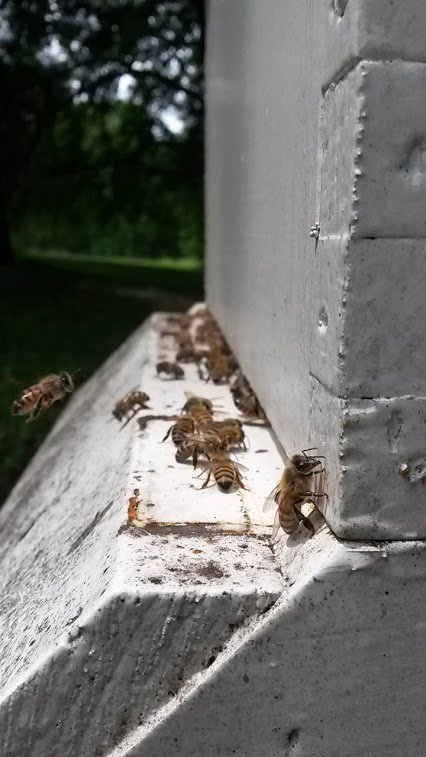 |  |
| landing zone | curious pup checking out a feeder |
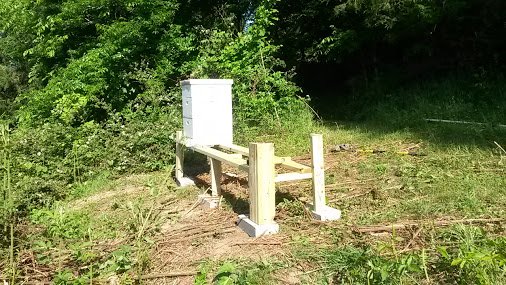 | |
| basic stand | lotta bees |
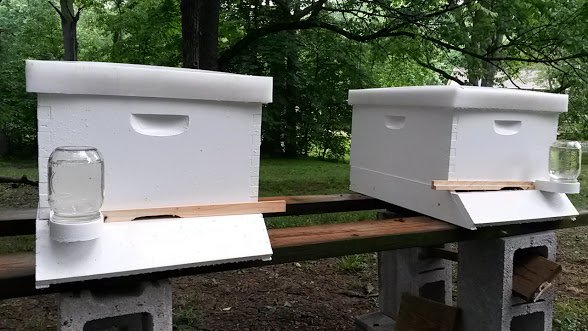 | |
| a frame with capped honey at top brood on the bottom | starter setup |
BASICS
- There is only one queen
- Almost all bees are female, only drones are male
- Basically all drones do is mate (then die)
- Drones can't sting
- If you keep bees you will get stung once in a while
- Most people aren't endangered by a sting, it's just a pain and discomfort
- Bees are hairy looking. Wasps, yellow jackets and such are smooth.
- If all the honey bees in North America died tomorrow it wouldn't stop pollination from happening and thus we all would not starve. Honey bees were imported from Europe so native pollinators would still be around.
- A hive will have 10 - 40 thousand bees or more
- For each bee you may only get one drop of honey
- It is common to harvest forty pounds of honey or more from a good hive
- A good bee keeper can split one hive into two or three per year but will not get much honey
- You probably will lose a hive in your first year of learning
If you are interested in beekeeping the best thing you can do is find a group near you and start attending meetings. Local factors are important and you'll meet experienced keepers, they are your most valuable resource. Keep in mind that if you ask five bee keepers about a specific subject you could get six answers. So glean what you can, respect the source, compare how things work out for you, ask more questions and then gauge what methods prove out.
Should you decide to take up this hobby you'll find many guides telling you what a starter kit should have. The obvious things are:
Hive parts
Bottom (base), Hive body (deep and medium sizes), frames (these go in the body), inner cover, outer cover (weather proof)
Tools & Gear
Veil and hat, hive tool, smoker, gloves
Bees
You need to obtain live bees! It can be done via mail, believe it or not the post office will even call you on a Sunday to come pick them up. Or you can get them delivered via private carrier. Since you've met up with long time bee keeps months ahead of time you can expect one or more of them to be selling when the time is right. Order in advance and have all your equipment ready! Not only will you help support a possible mentor you save the girls all the stress of being boxed up and hauled hundreds of miles.
A package of bees is the cheapest and consists of a three frames with brood (eggs, larva), nurse bees, worker bees and a queen.
A nucleus (aka "nuc") will be five frames of bees. The more the merrier so this is most common for people to start with.
Of course you can also find a complete hive for sale and if you have an experienced inspector check it out then it has the optimal chances to survive and provide you honey soonest.
One more thing; it's highly recommended that you begin with two hives so you can observe the differences in them and have a better success rate.
All said you can expect to spend close to a thousand dollars and wait months before you get that first jar of honey. This is not a hobby for impatient folks but it is a fascinating one.
Since starting I have learned to feed bees, eaten honey from my own hive, what pests and diseases to check for, captured a swarm of bees from inside someone's wall, made new friends, been stunned by loss and learned to build basic parts. I've ditched the gloves and just let the bees walk on my hands while I inspect the hive for health and monitor honey and pollen stores.
| swarm capture pics | . |
|---|---|
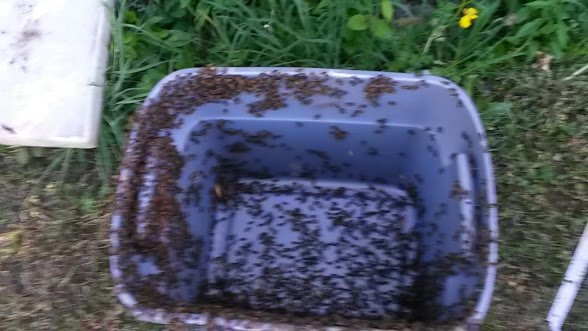 | 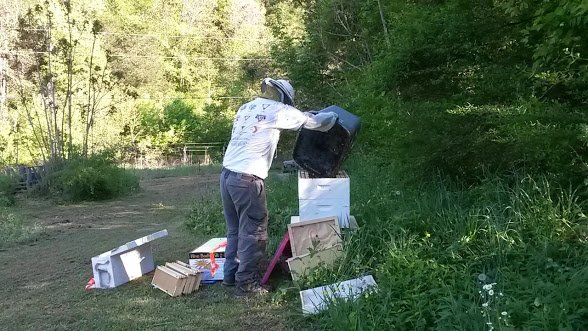 |
| I literally just scooped bees out of a wall cavity and dumped them into this box. And another box and another. | Then poured them into an empty hive! After closing it up I let all the stragglers find their way to the new home. |
If you've made it this far then you're ready to get out to the nearest club to learn more. Best of luck!
Ask Me Anything
I don't have a question right now. I need to think about it, but I think it is very cool you did an AMA.
I hope the AMA will be a help for anyone interested in starting and also seems to be the type of thing that will get Steemit to be more engaging. Without engagement we don't have a very social network.
That is so awesome what your doing! Bees are disappearing at alarming rates! And i love honey! Keep up the good work, the more bees the merrier! 🐝🐝🐝and we need all the polinators we can get!🐝🐝🐝
What happens to the bees during winter? Where I live it snows and can reach -22 fahrenheit (-30C) for 4 months.
Beekeepers seem to do well even if their hives have snow piled up high. They naturally stop rearing up young, huddle up in the middle of the hive, create heat shaking similar to the way humans do when cold. The honey and pollen they have stored gets them through the winter but you might supplement them by feeding them extra. It is probably the worst part of the year for them and is when a lot of hives are lost.
Four months is a long time but if you see bees around during the summer then that indicates they are surviving somewhere within a couple of kilometers.
An option might be to move your hive away to a warmer area during the winter so they would not have it so harsh.
Your question brings up something most people don't learn about until they start ordering live bees; there are many breeds of bees and several are popular for certain characteristics. For colder climates one might go with a Russian queen who is suited to long cold periods. The trade off is these bees may be more aggressive than say an Italian bee. Not that people don't do well with them or get stung so much more than others. And hybrid queens are also available so they have combined traits from different lines.
It would be very important for you to find other people with long winters and see if they are doing anything more specialized during the winter. It might mean having their entrance up higher, above the snow so they can still get out on the warmer days. Mike Bush is a notable bee keeper who lives with a lot of snow. http://www.bushfarms.com/beeswinter.htm